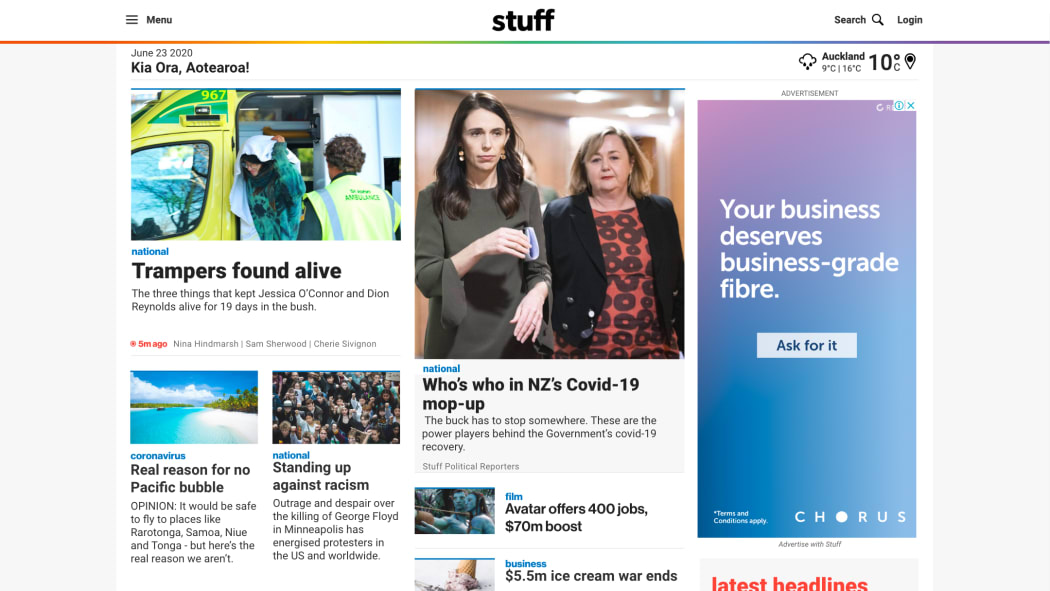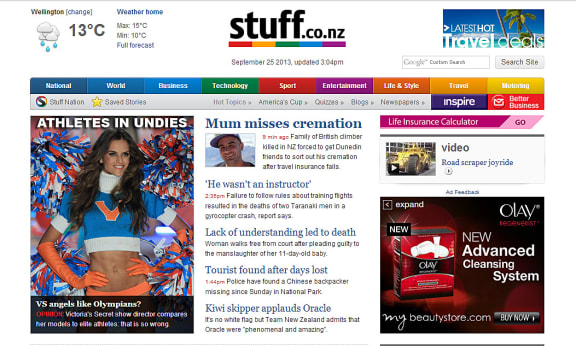Stuff is under new management and says public trust is a "core value" in its new era. "Social media is not news media" is one of its new slogans. For years it's been criticised for clickbait or low-quality journalism, but Hayden Donnell finds that doesn't really square with the bulk of the what the company publishes today.

Stuff's redesigned new website, featuring an array of useful stories Photo: supplied/
- *An earlier version of this article described a Steve Elers column for Stuff on the subject of Covid-19 testing - to which Stuff editors had added a clarification of the statistics used in the article - as “inaccurate.” Mediawatch and RNZ accepts that the column was the author’s opinion and not inaccurate.
When Stuff decided to stop posting on Facebook because it clashed with its “core public values”, it set off a predictable chorus of feedback.
“Stuff has core public values!? Anyone know what they are?,” one commenter asked RNZ’s Mediawatch, which did not reply.
“Stuff has so much ‘opinion’ dressed up as news that I can't be bothered with it anymore. Rather listen to Trump, at least he's funny,” another commenter told The Spinoff.
No-one gave any feedback on Stuff’s own story announcing the move, because in an act of foresight, its editors had disabled comments.
Stuff is wildly popular. It owns a stable of newspapers, and the fifth most-visited website in the country. That ranking is anomalously high for a news organisation .
But these kinds of complaints are common. Readers still regularly associate the site with low-quality or clickbait journalism.
The issue might partly be a hangover from the late-2000s and early 2010s, when many news websites including Stuff were accused of sometimes pursuing traffic at the expense of quality.
In a 2008 interview with Mediawatch’s Jeremy Rose, then-Stuff editor Mark Stevens said he didn’t have a problem with “giving the readers what they want”, though what they wanted sometimes amounted to “tits and bums”.

A Stuff homepage from 2013 Photo: Stuff
That ethos drove page views and revenue, but came at a more intangible reputational cost. A slightly more nuanced philosophy appears to be in play at the organisation as it stands today.
Though it still carries lively stories, Stuff has made a point of producing and prominently featuring a huge amount of the country’s most impressive public interest journalism in recent years.
It’s home to the Stuff Circuit team, which has carried out long-form investigations on subjects including the online hate that preceded the March 15 terror attack, deadly military neglect in Afghanistan, and abuse at Gloriavale.
Alison Mau’s #MeTooNZ is one of the most extensively fact-checked and legally vetted sections in New Zealand journalism, and recently exposed a toxic culture in the top ranks of AUT.
The company funds a dedicated climate change section, The Forever Project, which has made a controversial commitment to only feature scientifically accurate information.
Stuff also employs several of the best reporters in the country, from Henry Cooke to Florence Kerr, and recently signed the much-awarded investigative journalists Kirsty Johnston and Mike White away from The New Zealand Herald and Bauer Media respectively.
Stuff has made an editorial commitment to quality and trustworthiness as “core public values” this week - and editor Patrick Crewdson condemned Facebook as “a model built on outrage.”
But Stuff still publishes provocative opinion pieces by Massey University’s Dr Steve Elers and Damien Grant.

A Damien Grant column submitted about a month before Simon Bridges was rolled as National Party leader Photo: Stuff
However the vast bulk of the content it sends out to two million New Zealanders every month is useful, illuminating journalism.
Much of that can be credited to the leadership of the site’s new owner Sinead Boucher, who started as chief of Stuff’s digital arm in 2007, before buying the company for $1 in June.
She’s had a direct hand in commissioning many of its most lauded journalism initiatives.
In an interview with Mediawatch in March, Mau said her MeToo section was commissioned on the spot after she delivered an “elevator pitch” to Boucher.
More broadly, the company has made regular steps to improve the quality of its reporting under Boucher’s leadership.

Sinead Boucher Photo: supplied by Stuff.co.nz
According to a recent article marking Stuff’s 20th birthday, senior managers introduced a formal anti-clickbait policy to fight what they saw as the site’s unfair reputation for low-quality stories.
That’s partly a testament to a genuine desire to foreground high-quality, public interest reporting.
There's also a commercial imperative at play.
After Stuff’s decision to move away from Facebook was revealed, its editor Patrick Crewdson told RNZ’s Jesse Mulligan he saw some potential financial benefits in the move despite its potential cost in web traffic.
“The feedback that we’ve had from our commercial colleagues is that advertisers are increasingly talking to them about trust,” he said. “It’s not necessarily the case that they’re just going with Facebook where the convenience and the eyeballs are. I think a lot of advertisers will see the benefit of being on a trusted news platform.”
That fits with a broader trend for media. As tech giants like Google and Facebook swallow up the vast bulk of media revenue, more news organisations are trading on their reputation for quality.
That helps them drive subscriptions to premium services, and sign-ups for reader support. It’s also a point of difference for their advertising teams, which have been struggling to compete with Facebook and Google’s cheaper, more highly targeted ad offerings.
In the future media landscape, that could be vital. Survival might be less about being the biggest, and more about being the best.
On that measure, Stuff is staying ahead of the curve. Now it just needs more people to realise it.
Hear Stuff's editorial director Mark Stevens talk about clickbait, the move away from social media, and what readers really want on Mediawatch this Sunday after 9 on Sunday Morning with Jim Mora and after the 10pm news on Sunday night.


